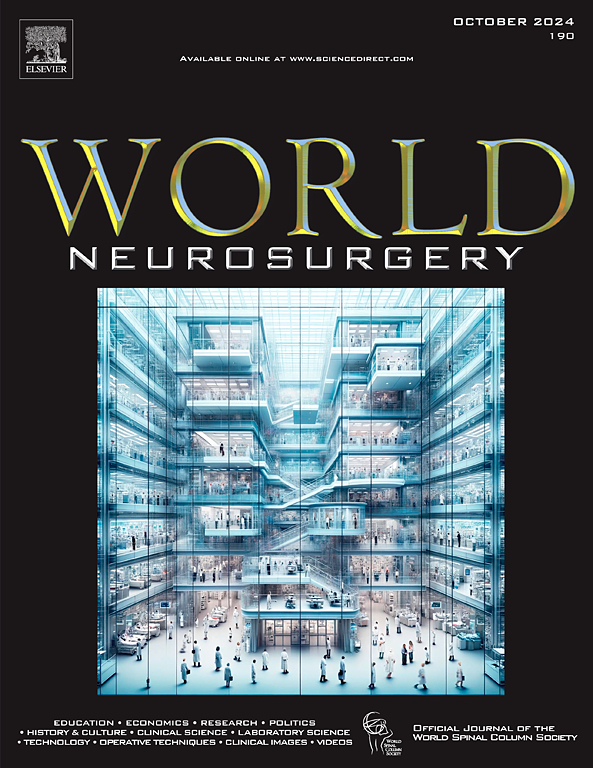分析长链非编码RNA在脂肪酸代谢中识别预后标志物并预测低级别胶质瘤的免疫治疗反应。
IF 1.9
4区 医学
Q3 CLINICAL NEUROLOGY
引用次数: 0
摘要
背景:低级别胶质瘤(LGG)因其早期诊断困难、治疗选择有限和预后差而臭名昭著,使其成为癌症研究的焦点。长链非编码rna (Long non-coding RNAs, lncRNAs)是肿瘤细胞代谢重编程的调控因子,为LGG的治疗提供了新的方向。方法:本研究采用来自癌症基因组图谱(TCGA)的数据,重点研究关键脂肪酸(FA)代谢相关的lncRNA。采用单因素/多因素和最小绝对收缩和选择算子(LASSO) cox回归建立了风险评分模型。此外,该研究通过评估LGG免疫标记物与肿瘤耐药之间的关联,评估了这些预后crna在LGG进展中的作用。最后,功能富集分析强调了这些lncrna的分子作用。结果:本研究共获得14个与预后相关的lncrna。该风险模型显示出良好的效度和信度,使其成为不同LGG风险患者预后的优越预测因子。在鉴定的lncRNA中,gight -1与LGG对当前化疗方案的敏感性显著相关,可能是影响LGG进展的关键lncRNA。高风险患者表现出t辅助细胞介导的免疫抑制,可能为未来的LGG免疫治疗铺平新的道路。结论:本研究以lncRNA调控和FA代谢重编程为核心,建立了创新性的LGG预后预测模型,具有良好的效度和信度。这些发现为LGG治疗的未来发展提供了新的分子和细胞靶点。本文章由计算机程序翻译,如有差异,请以英文原文为准。
Analysis of Long Noncoding RNA in Fatty Acid Metabolism to Identify Prognostic Markers and Predict Immunotherapy Response in Low-Grade Glioma
Background
Low-grade gliomas (LGGs) are notorious for their difficult early-stage diagnosis, limited treatment options, and poor prognosis, making them a focal point in cancer research. Long noncoding RNAs (lncRNAs) have been identified as regulators of metabolic reprogramming in tumor cells, offering new directions for LGG treatment.
Methods
This study employed data from The Cancer Genome Atlas, focusing on key fatty acid metabolism-related lncRNA. A risk scoring model was developed using univariate/multifactorial and least absolute shrinkage and selection operator Cox regression. Additionally, the study evaluated the role of these prognostic lncRNAs in LGG progression by assessing associations between LGG immune markers and tumor drug resistance. Finally, functional enrichment analysis highlighted the molecular roles of these lncRNAs.
Results
In this study, a total of 14 prognostic lncRNAs were obtained. The risk model demonstrated excellent validity and reliability, making it a superior predictor of prognosis among patients with varying LGG risks. Among the identified lncRNAs, GHET-1 was notably associated with LGG sensitivity to current chemotherapy options and might be a crucial lncRNA affecting LGG progression. High-risk patients exhibited T-helper cell-mediated immunosuppression, potentially paving new paths for future LGG immunotherapy.
Conclusions
Focusing on lncRNA regulation and fatty acid metabolism reprogramming, this study established an innovative prognostic prediction model for LGGs, showing outstanding validity and reliability. The findings offer new molecular and cellular targets for the future development of LGG treatments.
求助全文
通过发布文献求助,成功后即可免费获取论文全文。
去求助
来源期刊

World neurosurgery
CLINICAL NEUROLOGY-SURGERY
CiteScore
3.90
自引率
15.00%
发文量
1765
审稿时长
47 days
期刊介绍:
World Neurosurgery has an open access mirror journal World Neurosurgery: X, sharing the same aims and scope, editorial team, submission system and rigorous peer review.
The journal''s mission is to:
-To provide a first-class international forum and a 2-way conduit for dialogue that is relevant to neurosurgeons and providers who care for neurosurgery patients. The categories of the exchanged information include clinical and basic science, as well as global information that provide social, political, educational, economic, cultural or societal insights and knowledge that are of significance and relevance to worldwide neurosurgery patient care.
-To act as a primary intellectual catalyst for the stimulation of creativity, the creation of new knowledge, and the enhancement of quality neurosurgical care worldwide.
-To provide a forum for communication that enriches the lives of all neurosurgeons and their colleagues; and, in so doing, enriches the lives of their patients.
Topics to be addressed in World Neurosurgery include: EDUCATION, ECONOMICS, RESEARCH, POLITICS, HISTORY, CULTURE, CLINICAL SCIENCE, LABORATORY SCIENCE, TECHNOLOGY, OPERATIVE TECHNIQUES, CLINICAL IMAGES, VIDEOS
 求助内容:
求助内容: 应助结果提醒方式:
应助结果提醒方式:


